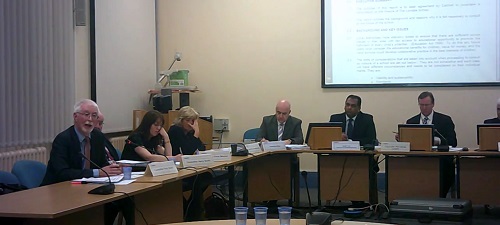Wirral Council committee appointments for the 2014/15 municipal year
This is a list of which councillor is on which committee for the 2014/15 year. It doesn’t include deputies (but the list of deputies can be found here at pages thirteen to twenty-three). This is the original list as agreed at the Annual Meeting (Part 2) of the Council on the 9th June 2014 (and published on the 23rd June 2014). Changes can be made throughout the 2014/15 year.
Cabinet (10 councillors)
Cllr Phil Davies (Leader of the Council and Cabinet Member for Finance)
Cllr Ann McLachlan (Governance, Commissioning and Improvement & Joint Deputy Leader of the Council)
Cllr George Davies (Neighbourhoods, Housing and Engagement & Joint Deputy Leader of the Council)
Cllr Adrian Jones (Support Services)
Cllr Christine Jones (Adult Social Care and Public Health)
Cllr Chris Meaden (Leisure, Sport and Culture)
Cllr Pat Hackett (Economy)
Cllr Tony Smith (Children and Family Services)
Cllr Bernie Mooney (Environment and Sustainability)
Cllr Stuart Whittingham (Highways and Transport)
Although there are no deputies for Cabinet, there are ten assistant portfolio holders.
Audit and Risk Management Committee (9 councillors)
Councillor John Hale (Conservative spokesperson)
Councillor David Elderton (Conservative)
Councillor Adam Sykes (Conservative)
Councillor Jim Crabtree (Labour & Chair)
Councillor Ron Abbey (Labour & Vice-Chair)
Councillor Paul Doughty (Labour)
Councillor Matthew Patrick (Labour)
Councillor Joe Walsh (Labour)
Councillor Stuart Kelly (Liberal Democrat spokesperson)
In addition to the above there are eight Conservative deputies, eight Labour deputies and five Liberal Democrat deputies.
Employment and Appointments Committee (8 councillors)
Councillor Jeff Green (Conservative spokesperson)
Councillor Lesley Rennie (Conservative)
Councillor Adrian Jones (Labour & Chair)
Councillor Phil Davies (Labour & Vice-Chair)
Councillor George Davies (Labour)
Councillor Ann McLachlan (Labour)
Councillor Moira McLaughlin (Labour)
Councillor Phil Gilchrist (Liberal Democrat spokesperson)
In addition to the above there are eight Conservative deputies, eight Labour deputies and five Liberal Democrat deputies.
Licensing, Health and Safety and General Purposes Committee (9 councillors)
Councillor Andrew Hodson (Conservative spokesperson)
Councillor Leah Fraser (Conservative)
Councillor Geoffrey Watt (Conservative)
Councillor Bill Davies (Labour & Chair)
Councillor Steve Niblock (Labour & Vice-Chair)
Councillor John Salter (Labour)
Councillor Christine Spriggs (Labour)
Councillor Mike Sullivan (Labour)
Councillor Pat Williams (Liberal Democrat spokesperson)
In addition to the above there are eight Conservative deputies, eight Labour deputies and five Liberal Democrat deputies.
Licensing Act 2003 Committee (15 councillors)
Councillor Eddie Boult (Conservative)
Councillor Gerry Ellis (Conservative)
Councillor Andrew Hodson (Conservative)
Councillor Mike Hornby (Conservative)
Councillor Bill Davies (Labour, Chair)
Councillor Steve Niblock (Labour, Vice-Chair (from 18th June 2014))
Councillor George Davies (Labour)
Councillor Tony Norbury (Labour)
Councillor Louise Reecejones (Labour)
Councillor Denise Roberts (Labour)
Councillor John Salter (Labour)
Councillor Harry Smith (Labour)
Councillor Mike Sullivan (Labour)
Councillor Dave Mitchell (Liberal Democrat)
Councillor Pat Williams (Liberal Democrat)
There are no deputies for this committee.
Pensions Committee (10 Wirral Council councillors plus 5 co-opted members)
Councillor Geoffrey Watt (Conservative spokesperson)
Councillor Mike Hornby (Conservative)
Councillor Cherry Povall (Conservative)
Councillor Paul Doughty (Labour, Chair)
Councillor Ann McLachlan (Labour, Vice-Chair)
Councillor George Davies (Labour)
Councillor Treena Johnson (Labour)
Councillor Adrian Jones (Labour)
Councillor Harry Smith (Labour)
Councillor Chris Carubia (Liberal Democrat spokesperson)
Co-opted members
Councillor Norman F Keats (Labour, Knowsley Council)
Councillor John Fulham (Labour, St Helens Council)
Councillor Paul Tweed (Labour, Sefton Council)
Councillor Patrick Hurley (Labour, Liverpool City Council)
Patrick McCarthy
In addition to the above there are eight Conservative deputies, eight Labour deputies and four Liberal Democrat deputies.
Planning Committee (13 councillors)
Councillor David Elderton (Conservative spokesperson)
Councillor Eddie Boult (Conservative)
Councillor Paul Hayes (Conservative)
Councillor Kathy Hodson (Conservative)
Councillor Anita Leech (Labour, Chair)
Councillor Denise Realey (Labour, Vice-Chair)
Councillor Phillip Brightmore (Labour)
Councillor Matt Daniel (Labour)
Councillor Christine Spriggs (Labour)
Councillor Joe Walsh (Labour)
Councillor Irene Williams (Labour)
Councillor Stuart Kelly (Liberal Democrat spokesperson)
Councillor Pat Cleary (Green Party spokesperson)
In addition to the above there are eight Conservative deputies, eight Labour deputies and five Liberal Democrat deputies.
Standards and Constitutional Oversight Committee (9 councillors, 4 independent persons)
Councillor Les Rowlands (Conservative spokesperson)
Councillor Gerry Ellis (Conservative)
Councillor John Hale (Conservative)
Councillor Bill Davies (Labour, Chair)
Councillor Moira McLaughlin (Labour, Vice-Chair)
Councillor Rob Gregson (Labour)
Councillor Denise Roberts (Labour)
Councillor John Salter (Labour)
Councillor Pat Williams (Liberal Democrat spokesperson)
Independent persons
Professor R S Jones (until 15th July 2016)
Mr C Jones (until 15th July 2016)
Mr D Burgess-Joyce (until 15th July 2016)
Mr B Cummings (until 15th July 2016)
In addition to the above there are eight Conservative deputies, eight Labour deputies and five Liberal Democrat deputies.
Coordinating Committee (15 councillors, 4 co-opted members)
Councillor Chris Blakeley (Conservative spokesperson)
Councillor Tom Anderson (Conservative)
Councillor Wendy Clements (Conservative)
Councillor Mike Hornby (Conservative)
Councillor Steve Williams (Conservative)
Councillor Moira McLaughlin (Labour, Chair)
Councillor Paul Doughty (Labour, Vice-Chair)
Councillor Phillip Brightmore (Labour)
Councillor Anita Leech (Labour)
Councillor Christina Muspratt (Labour)
Councillor Walter Smith (Labour)
Councillor Mike Sullivan (Labour)
Councillor Jerry Williams (Labour)
Councillor Janette Williamson (Labour)
Councillor Phil Gilchrist (Liberal Democrat spokesperson)
Co-opted members (when dealing with education matters with voting rights)
Roman Catholic Diocese Mr Damian Cunningham
Church of England Vacancy
Mrs H Shoebridge (parent governor) until 28th October 2015
Mrs Nicola Smith (parent governor) until 8 February 2017
In addition to the above there are eight Conservative deputies, eight Labour deputies and five Liberal Democrat deputies.
Families and Wellbeing Policy and Performance Committee (15 councillors, 4 co-opted members)
Councillor Wendy Clements (Conservative spokesperson)
Councillor Bruce Berry (Conservative)
Councillor Paul Hayes (Conservative)
Councillor Mike Hornby (Conservative)
Councillor Cherry Povall (Conservative)
Councillor Moira McLaughlin (Labour, Chair)
Councillor Denise Roberts (Labour, Vice-Chair)
Councillor Phillip Brightmore (Labour)
Councillor Treena Johnson (Labour)
Councillor Tony Norbury (Labour)
Councillor Walter Smith (Labour)
Councillor Christine Spriggs (Labour)
Councillor Janette Williamson (Labour)
Councillor Alan Brighouse (Liberal Democrat spokesperson)
Councillor Pat Cleary (Green Party spokesperson)
Co-opted members (with voting rights)
Roman Catholic Diocese Mr Damian Cunningham
Church of England Vacancy
Mrs H Shoebridge (parent governor) until 28th October 2015
Mrs Nicola Smith (parent governor) until 8 February 2017
In addition to the above there are eight Conservative deputies, eight Labour deputies and five Liberal Democrat deputies.
Regeneration and Environment Policy and Performance Committee (15 councillors)
Councillor Steve Williams (Conservative spokesperson)
Councillor Gerry Ellis (Conservative)
Councillor John Hale (Conservative)
Councillor Andrew Hodson (Conservative)
Councillor Tracey Smith (Conservative)
Councillor Mike Sullivan (Labour, Chair)
Councillor Jerry Williams (Labour, Vice-Chair)
Councillor Jim Crabtree (Labour)
Councillor Matt Daniel (Labour)
Councillor Rob Gregson (Labour)
Councillor Anita Leech (Labour)
Councillor Steve Niblock (Labour)
Councillor Denise Realey (Labour)
Councillor Jean Stapleton (Labour)
Councillor Dave Mitchell (Liberal Democrat spokesperson)
In addition to the above there are eight Conservative deputies, eight Labour deputies and five Liberal Democrat deputies.
Transformation and Resources Policy and Performance Committee (15 councillors)
Councillor Adam Sykes (Conservative spokesperson)
Councillor Tom Anderson (Conservative)
Councillor Bruce Berry (Conservative)
Councillor Kathy Hodson (Conservative)
Councillor Tracey Smith (Conservative)
Councillor Janette Williamson (Labour, Chair)
Councillor Paul Doughty (Labour, Vice-Chair)
Councillor Matt Daniel (Labour)
Councillor Rob Gregson (Labour)
Councillor Matthew Patrick (Labour)
Councillor Christina Muspratt (Labour)
Councillor Louise Reecejones (Labour)
Councillor Joe Walsh (Labour)
Councillor Irene Williams (Labour)
Councillor Phil Gilchrist (Liberal Democrat spokesperson)
In addition to the above there are eight Conservative deputies, eight Labour deputies and five Liberal Democrat deputies.
Birkenhead Constituency Committee (18 councillors, 1 co-opted member)
Councillor Jim Crabtree (Labour, Bidston & St. James)
Councillor Ann McLachlan (Labour, Bidston & St. James)
Councillor Harry Smith (Labour, Bidston & St. James)
Councillor Pat Cleary (Green, Birkenhead & Tranmere)
Councillor Phil Davies (Labour, Birkenhead & Tranmere)
Councillor Jean Stapleton (Labour, Birkenhead & Tranmere)
Councillor George Davies (Labour, Claughton)
Councillor Steve Foulkes (Labour, Claughton)
Councillor Denise Roberts (Labour, Claughton)
Councillor Alan Brighouse (Liberal Democrat, Oxton)
Councillor Stuart Kelly (Liberal Democrat, Oxton)
Councillor Pat Williams (Liberal Democrat, Oxton)
Councillor Paul Doughty (Labour, Prenton)
Councillor Tony Norbury (Labour, Prenton)
Councillor Denise Realey (Labour, Prenton)
Councillor Bill Davies (Labour, Rock Ferry)
Councillor Chris Meaden (Labour, Rock Ferry)
Councillor Moira McLaughlin (Labour, Rock Ferry)
Co-opted Member
Rt Hon Frank Field MP (Chair)
Wallasey Constituency Committee (18 councillors, 6 community representatives)
Councillor Ron Abbey (Labour, Leasowe and Moreton East)
Councillor Treena Johnson (Labour, Leasowe and Moreton East)
Councillor Anita Leech (Labour, Leasowe and Moreton East)
Councillor Matt Daniel (Labour, Liscard)
Councillor Bernie Mooney (Labour, Liscard)
Councillor Janette Williamson (Labour, Liscard)
Councillor Bruce Berry (Conservative, Moreton West and Saughall Massie)
Councillor Chris Blakeley (Conservative, Moreton West and Saughall Massie)
Councillor Steve Williams (Conservative, Moreton West and Saughall Massie)
Councillor Rob Gregson (Labour, New Brighton)
Councillor Pat Hackett (Labour, New Brighton)
Councillor Christine Spriggs (Labour, New Brighton)
Councillor Adrian Jones (Labour, Seacombe)
Councillor Chris Jones (Labour, Seacombe)
Councillor John Salter (Labour, Seacombe)
Councillor Leah Fraser (Conservative, Wallasey)
Councillor Paul Hayes (Conservative, Wallasey)
Councillor Lesley Rennie (Conservative, Wallasey)
Community Representatives
Mr Ken Harrison
Mr Brian Higgins
Mr Tony Jones
Mr Keith Raybould
Mr Paul Roberts
Mr Lewis Collins
Wirral South Constituency Committee (15 councillors, up to 6 community representatives)
Councillor Christina Muspratt (Labour, Bebington)
Councillor Walter Smith (Labour, Bebington)
Councillor Jerry Williams (Labour, Bebington)
Councillor Steve Niblock (Labour, Bromborough)
Councillor Joe Walsh (Labour, Bromborough)
Councillor Irene Williams (Labour, Bromborough)
Councillor Cherry Povall (Conservative, Clatterbridge)
Councillor Tracey Smith (Conservative, Clatterbridge)
Councillor Adam Sykes (Conservative, Clatterbridge)
Councillor Chris Carubia (Liberal Democrat, Eastham)
Councillor Phil Gilchrist (Liberal Democrat, Eastham)
Councillor Dave Mitchell (Liberal Democrat, Eastham)
Councillor Andrew Hodson (Conservative, Heswall)
Councillor Kathy Hodson (Conservative, Heswall)
Councillor Les Rowlands (Conservative, Heswall)
Community representatives
Unknown
Wirral West Constituency Committee (15 councillors plus six co-opted community representatives)
Councillor Tom Anderson (Conservative, Greasby, Frankby & Irby)
Councillor Wendy Clements (Conservative, Greasby, Frankby & Irby)
Councillor Mike Hornby (Conservative, Greasby, Frankby & Irby)
Councillor Eddie Boult (Conservative, Hoylake & Meols)
Councillor Gerry Ellis (Conservative, Hoylake & Meols)
Councillor John Hale (Conservative, Hoylake & Meols)
Councillor Phillip Brightmore (Labour, Pensby & Thingwall)
Councillor Louise Reecejones (Labour, Pensby & Thingwall)
Councillor Michael Sullivan (Labour, Pensby & Thingwall)
Councillor Matthew Patrick (Labour, Upton)
Councillor Tony Smith (Labour, Upton)
Councillor Stuart Whittingham (Labour, Upton)
Councillor David Elderton (Conservative, West Kirby & Thurstaston)
Councillor Jeff Green (Conservative, West Kirby & Thurstaston)
Councillor Geoffrey Watt (Conservative, West Kirby & Thurstaston)
Community Representatives
Jackie Hall (Hoylake and Meols)
John Smith (Greasby, Frankby & Irby)
Lynn Collier (Pensby & Thingwall)
Elise Wong (Upton)
David Wade (West Kirby & Thurstaston)
If you click on any of the buttons below, you’ll be doing me a favour by sharing this article with other people.


